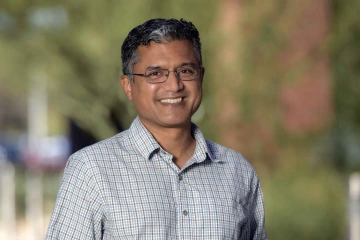Bhattacharya named inaugural executive director of CAMI
The Center for Advanced Molecular and Immunological Therapies will be led by Deepta Bhattacharya, PhD, a renowned immunologist at the College of Medicine – Tucson.

The Center for Advanced Molecular and Immunological Therapies, or CAMI, will be a national biomedical research hub located on the Phoenix Bioscience Core in downtown Phoenix.
Courtesy of McCarthy + SmithGroup (rendering for illustrative purposes only)
The University of Arizona Health Sciences announced today that Deepta Bhattacharya, PhD, will take the helm as inaugural executive director of the Center for Advanced Molecular and Immunological Therapies, effective July 1.

Deepta Bhattacharya, PhD, has been selected to lead the Center for Advanced Molecular and Immunological Therapies at the University of Arizona Health Sciences.
Photo by Kris Hanning, UArizona Health Sciences Office of Communications
Bhattacharya is a professor at the UArizona College of Medicine – Tucson’s Department of Immunobiology and currently serves on the CAMI Advisory Council, a group of distinguished leaders of science, government and private industry from across Arizona. As a committee chair, he played an integral role in the development of CAMI, a biomedical research hub that will open new doors of discovery and advance precision medicine to improve health outcomes for people across Arizona and around the world.
“I cannot imagine a person better suited to lead CAMI than Dr. Bhattacharya,” said Michael D. Dake, MD, senior vice president for the University of Arizona Health Sciences. “His experience and track record of successful collaborations, innovation and entrepreneurship give him the skills and vision needed to bring CAMI to life on the Phoenix Bioscience Core.”
Bhattacharya did his undergraduate work in biochemistry at Indiana University and received his doctorate in molecular and cell biology from the University of California, Berkeley. He completed a postdoctoral fellowship at Stanford University, where he studied the cell biology of hematopoietic stem cells and their differentiated progeny. He started his own lab at Washington University in St. Louis in 2008.
In 2017, Bhattacharya returned to Tucson, his birthplace, to join the Department of Immunobiology. His research merges the fields of stem cell biology and immunology to understand the basic biology of lymphocyte development and develop creative translational strategies to combat infectious disease.
“I have been privileged to help guide the formation of CAMI over the last few years, and I am excited to be able to direct the next stage of its development,” Bhattacharya said. “There is a real opportunity to move the basic immunological discoveries being made at the University of Arizona and our partner institutions into new therapies for infectious diseases, autoimmune conditions and cancers. Through CAMI, we can take these basic findings across the finish line and start new companies focused on the diagnosis, prevention and treatment of diseases with an immunological basis.”
Bhattacharya, who is also a member of the UArizona Cancer Center and BIO5 Institute, has published more than 70 peer-reviewed papers and been continuously funded by the National Institutes of Health since 2007. He received a prestigious Robertson Investigator award from the New York Stem Cell Foundation, has served as an editor for the Journal of Immunology, and was a standing member on grant review panels for the National Institutes of Health.
He is chair of the American Association of Immunologists Committee for Public Communications and a member of the scientific advisory board at Hillevax. He previously served on a GlaxoSmithKline advisory panel for COVID-19 therapeutics. Bhattacharya was a scientific co-founder of Clade Therapeutics, a recently acquired startup that is using stem cell-derived immune cells to develop new medications for the treatment of cancer and autoimmune diseases.
Contact
Stacy Pigott
UArizona Health Sciences Office of Communications
520-539-4152, spigott@arizona.edu

